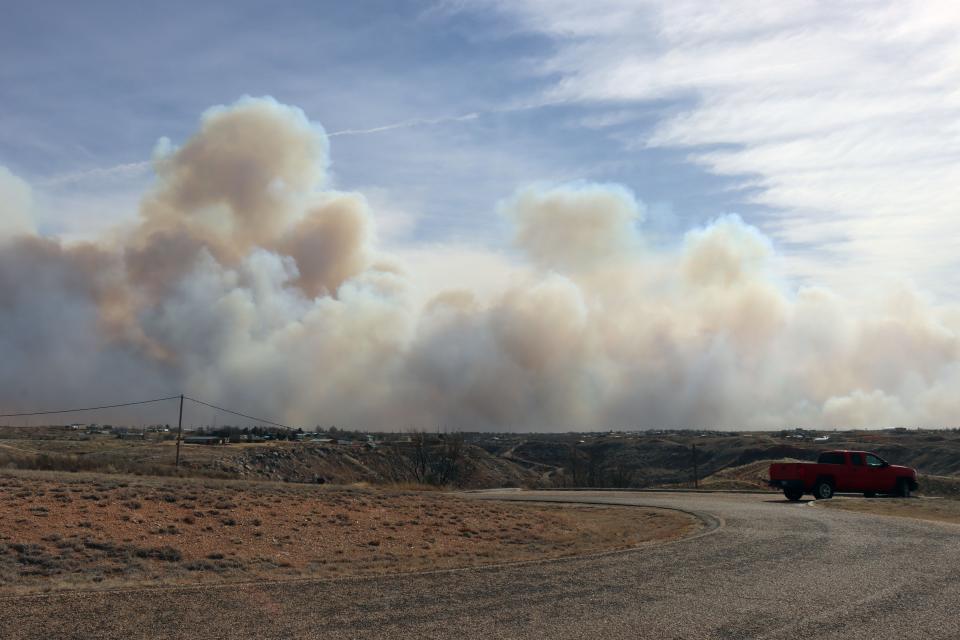West Texas fires reducing air quality to unhealthy levels. Here's how to stay safe:
Thick smoke and dust flooded the air from Amarillo to Lubbock, causing air quality levels to fluctuate to dangerous levels across the Texas South Plains and Panhandle.
The unhealthy air prompted officials at schools and other organizations to limit outdoor activity, and health experts warned about potential risks from exposure to the smoky air.
According to the Environmental Protection Agency's AirNow map, Amarillo's air quality reached unhealthy levels from 3 p.m. Tuesday to 1 a.m. Wednesday, with air quality levels reaching very unhealthy levels at 7 p.m. Tuesday
Two hours south, Lubbock saw air quality levels reach unhealthy levels early Wednesday morning but improve throughout the day. Early Wednesday, Lubbock Independent School District sent a message to parents saying they planned to limit outdoor exposure for students.
"Due to the smoke from the wildfires in the Panhandle area, we have made the decision to keep students indoors for recess and restrict outdoor activities for athletics," reads the statement from LISD Superintendent Kathy Rollo. "The health and safety of our students is our top priority, and this measure is in line with recommendations from health authorities to minimize exposure to smoke. The poor air quality can pose health risks, especially to children, and we believe this action is necessary to ensure their safety. We are closely monitoring the situation and are in contact with local health and environmental authorities. We will evaluate the need for any changes at the end of the day and keep you updated."

More: West Texas fire becomes 2nd largest in state history. What we know
As of mid-afternoon Wednesday, air quality levels were improving to moderate levels.
But with the 2nd largest fire in Texas history continuing to grow, a local health expert offered safety tips to help deal with fluctuating air quality.
Health tips for poor air quality
Dr. Fiona Prabhu, a family medicine physician at Texas Tech Health Sciences Center, said individuals should take precautions when there is smoke and the air quality degrades.
"When we have wildfires, we have all sorts of other byproducts that get released. It depends on whether something is flaming or if something is smoldering," Prabhu said. "They have aldehydes, carbon dioxide, nitrous oxide - all kinds of other particles."
She said these particulates are as small as a virus and can easily be inhaled by individuals. However, individuals with asthma, heart disease or pregnant women are more susceptible to the pollutants the fires produce.
For pregnant women, Prabhu said pregnancy actually decreases the body's immune system, and with those who suffer from heart disease, the particulates can inflame the arteries, which adds more stress to the heart.
Prabhu gave the following safety tips:
Limit outdoor activity. If you have to go outside, wear a mask.
Use HEPA filters in the home.
Ensure doors and windows are closed securely.
She said if an individual's oxygen intake drops below 92% using a pulse ox monitor or is having difficulty breathing and taking deep breaths, they should go to an emergency department.
Future air quality from West Texas fires
The National Weather Service in Lubbock predicts the wind will shift to the north throughout the day on Wednesday.
Winds will gradually shift from out of the NE to SE today and any lingering smoke should exit the Lubbock area by this evening. Winds will remain southerly/westerly through the weekend. #lubwx #txwx pic.twitter.com/BPGSxkUjGC
— NWS Lubbock (@NWSLubbock) February 28, 2024
NWS in Amarillo, a spokesperson stated in a press conference Wednesday afternoon that the area is expecting a chance of precipitation Thursday and is expected not to do much to help slow down the fire. They further said that warmer temperatures and higher wind speeds will return by Friday and into the weekend.
This article originally appeared on Lubbock Avalanche-Journal: West Texas fires reducing air quality levels. Here's how to stay safe

